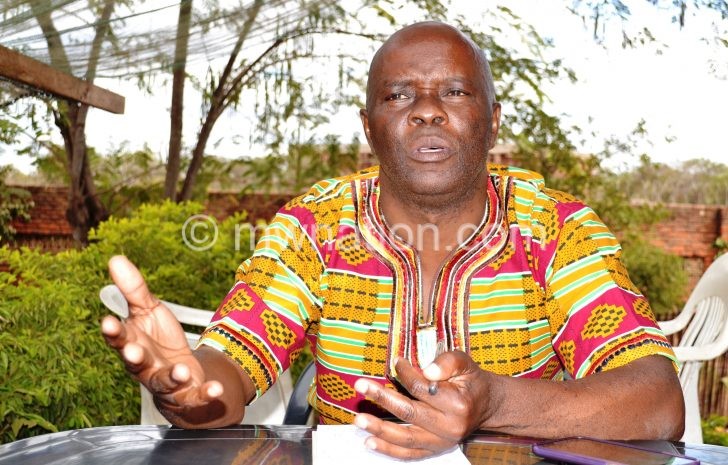Reverend Father Francis Chipala

On October 26 this year, Reverend Father Francis Chipala of Ulongwe/Namalomba Anglican Parish will celebrate silver jubilee, having served as a priest for 25 years. But what does it mean to be a priest? What is it that attracted the then youthful Francis to join priesthood? And does he find the vocation still relevant in the dynamic world? Our reporter, WATIPASO MZUNGU JNR, finds out in this interview.
Who is Reverend Father Francis Chipala?
I come from Wayiyatsa Village, Traditional Authority Symon in Neno. I was born on January 22 1961. I am the last born in a family of four boys.
What made you to become a priest?
My father was one of the long-serving catechists of the Anglican Church. In 1971, he was ordained a deacon and two years later, he was ordained a priest. He, however, did not serve God in this position for a long time as he died two years later. I was deeply inspired by his dedication to God’s work.
I, therefore, decided to join priesthood so that I could extend the work my father had begun.
So, in other words, God did not call you, but you were simply trying to please your father’s soul?
No, I was called just like any other priest. The only difference is how God called me. I feel the wish to extend my father’s work is God’s call on its own.
I also thought that being a priest would help me safeguard my moral and spiritual life.
Having joined the clergy 25 years ago, how do you think the Church has benefitted from you?
Of course, it’s difficult for me to give myself credit. But suffice to say the church has benefitted a lot through the many baptisms I’ve conducted during the period I have been a priest, I have witnessed the church growing and I believe I’ve played a part in its expansion. Most importantly, I thank God for using me to proclaim His gospel to thousands of people in the Anglican Diocese of the Upper Shire.
What have been your major roles and responsibilities?
There are so many, but I’ll mention just a few. I was once Diocesan communications officer; I was twice appointed Archdeacon and Diocesan HIV and Aids coordinator.
In fact, I was the pioneer of this programme in the Dioceses of Upper Shire and Southern Malawi. It was during this time that I learnt a lot as I used to travel a lot both within and outside Malawi. I was one of the three people who developed a five-year strategic plan for the Diocese of Upper Shire. I was also appointed Mothers Union chaplain and later took the responsibility of coordinating permaculture activities, which is one of the components in the Mothers Union.
At one time, I was a member of the Diocesan Development Board and currently a member of the Diocesan Sunday School Board.
What do you find to be the most interesting part of your calling?
One thing I should emphasise on is that priesthood is a service. If you’ve been called into this life, it means you’ve been called to serve God the rest of your life [through people].
Thus, I am glad to serve God through the people I reach out to with His word of hope and salvation. As a priest, my role is to give hope among the hopeless, life to the dying and happiness to the sad. That’s what I find to be the most interesting part of priesthood.
And what about the most demoralising aspect?
Well, as a human being there are indeed a number of challenges that make my life disheartening, at times. Even though I am God’s own chosen servant, one thing that you must appreciate is that I am both body and soul. Spiritually, I am very comfortable, but sometimes the challenge comes in when you don’t have enough money to enable you to live a decent life.
You might wish to know that priesthood is not a professional job. It’s a call to service such that there’s no salary. This may make one’s life incomplete, especially when your thoughts are on living an abundant life in an environment that can’t meet your expectations.
So, how have you been dealing with this challenge?
The most important thing I did was to accept the call of God unconditionally. I chose to serve God in plenty as well as in poverty. It has not been difficult for me because I’ve committed my life to God who satisfies all my needs.
And through prayer, I have overcome any other temptations, and that’s how I have managed to walk this long and I’m still walking to the end.
Where will your silver jubilee celebrations take place?
Namalomba Parish, Ulongwe on October 26 2013. But some guests will start arriving as early as October 24. We expect to receive a cross-section of people, including politicians and Christians from other denominations.



